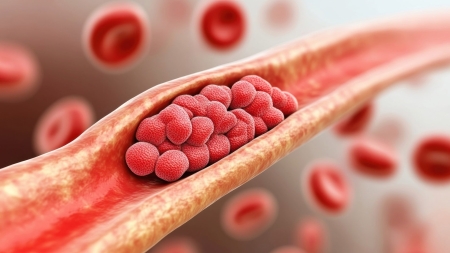Focus on men’s health
How genetics consultations and tests improve the prevention and treatment of prostate cancer.

Genetic consultations and tests are no longer a long way off. The field of genetic medicine is currently undergoing a surge in popularity and significance in the area of prostate cancer: Oncologist Dr Aurelius Omlin PD explains how genetic consultations and testing can be used effectively in the screening and treatment of prostate cancer.
It is well known that breast cancer can be passed on through inherited gene variants. What role do genes play in prostate cancer?
As early as in the 1960s, there was evidence that some families had a higher incidence of prostate cancer than others. Research has also shown that the risk within families grows as the number of people affected increases. For example, having a brother with the disease doubles the risk for his other male relatives.
A real breakthrough in prostate cancer research was made in 2016: a large-scale study comprising over 700 prostate cancer patients with an advanced stage of the disease demonstrated that 10 to 12 per cent of cases are hereditary and that those affected carry a corresponding pathogenic gene variant.
Which genes are involved here?
It's fascinating: basically, they are the same genes that are also responsible for hereditary breast cancer: namely BRCA1 and BRCA2. Prostate cancer is usually caused by a mutation in the BRCA2 gene.
By the way: not only do the men affected have an increased risk of prostate cancer, they also have a higher risk of developing pancreatic cancer, male breast cancer and malignant melanoma.
How can find out if I have a genetic predisposition to prostate cancer?
The first indication of your individual risk can be found in your family's medical history: if a grandfather, uncle, father or brother developed prostate cancer at a young age, it is a sign of an increased risk. Other important factors include a family history of breast cancer, skin cancer, ovarian cancer and pancreatic cancer.
A genetic consultation with a specialist helps to determine the risk of prostate cancer and other types of cancer. A genetic test can then be used to confirm or rule out a suspicion.
What should I do if a particular gene variant is detected in my case?
Men with a family history of prostate cancer are recommended to be screened for prostate cancer from the age of 45. This includes palpation of the prostate and blood tests (PSA). Depending on the level of risk, the check-ups should be repeated every 1 to 3 years. If the findings are unusual, the patient must go for an MRI scan.
Carriers of genetic mutations usually develop the disease earlier and at a more aggressive rate. Early and frequent check-ups are therefore extremely important. Taking preventative steps can save lives – this is a fact that people are still not sufficiently aware of.
Before now, prostate cancer screening was based on the PSA value. Does it still make sense to perform this screening, or should all men now seek a genetic consultation instead?
It is not an either-or situation, but you simply need to realise that the risk of prostate cancer in some people can be higher due to genetic factors. If there is a corresponding family medical history, it may make sense to arrange a genetic consultation. However, without evidence of a family predisposition, I would not recommend having the test done. The standard check-ups are all that is needed.
If the patient has a family history of the disease, the cancer can develop very quickly. For example, I treated a patient who had already been diagnosed with elevated PSA values for some time. When analysing his family medical history, it struck me that the patient's mother was diagnosed with breast cancer at a relatively young age and that one of his brothers had pancreatic cancer. With a family medical history like this, a biopsy of the prostate should be considered if the PSA value is raised even if the MRI is normal. The patient in question went on to be diagnosed with prostate cancer, which, unfortunately was already at an advanced stage, and the genetic test identified a pathogenic BRCA2 mutation.
Is genetic testing covered by health insurance?
Genetic consultation is covered by basic health insurance (KVG). If a genetic test is recommended on the basis of the patient's family medical history, we will apply for the pre-approval of the costs involved. In order to make a case, we need a family tree showing the medical history as well as the patient's personal circumstances. If the application is properly documented, we usually manage to get the health insurance company to cover the costs.
Does it still make sense to undergo genetic testing if I have already been diagnosed with prostate cancer?
Yes, it definitely makes sense to find out if the cancer is hereditary. This means that family members can also determine what their risk is, if needed.
In addition, we can now also examine the genetic make-up of the tumour itself: Different types of treatment may work better or worse depending on the tumour. To this end, we perform what is known as gene expression profiling, for instance: We examine 30 to 40 samples of the cancer tissue and can therefore classify the tumours into aggressive and less aggressive forms. This enables us to assess the risk more accurately and fine-tune the treatment. Alongside PSA, MRI and prostate biopsy, gene expression profiling can provide additional useful information. The first gene expression analysis of this kind has been available in Switzerland since September 2022.
What has been the greatest success you have had with genetic testing so far?
We have always had real success with it, but especially with the genetic testing of tumour tissue that I mentioned earlier. This is where we can see changes that make new forms of treatment possible, e.g. immunotherapy. In the case of a patient with an aggressive form of prostate cancer, for whom the usual prescribed drugs were no longer effective, we were able to obtain reimbursement for immunotherapy on the basis of changes in the tumour tissue. Immunotherapy quickly brought about a positive and sustained response to the disease.


